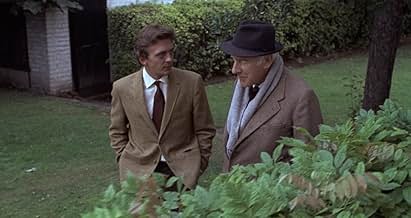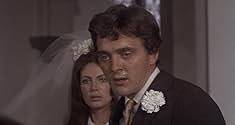IMDb RATING
6.1/10
1.1K
YOUR RATING
Reformed drug addict Tim Brett (David Hemmings) is vacationing in Italy with his aunt. When she is murdered, he tries to investigate. Soon his whole life spins out of control.Reformed drug addict Tim Brett (David Hemmings) is vacationing in Italy with his aunt. When she is murdered, he tries to investigate. Soon his whole life spins out of control.Reformed drug addict Tim Brett (David Hemmings) is vacationing in Italy with his aunt. When she is murdered, he tries to investigate. Soon his whole life spins out of control.
- Director
- Writers
- Stars
Wilfrid Hyde-White
- Mr. Copsey
- (as Wilfrid Hyde White)
- Director
- Writers
- All cast & crew
- Production, box office & more at IMDbPro
Featured reviews
How much you like Fragment of Fear depends on how much you've seen of the type of film it is. David Hemmings believes some sort of peculiar conspiracy behind the murder of his rich aunt and he goes about his way to prove it back in London, except he gets his apartment broken into, strange messages and cackling laughter mysteriously appear on his tape recorder, and someone appears to have sent him a warning letter written on his own paper with his own typewriter. There's a girl on the side which he wants to marry and he's had a drug problem a few years back so that no one around him believes his ravings about a secret society out to silence him because he used to be a dope fiend. We even get the "we have no such person working here" mystery man cliché and if you're reading this, chances are you've seen variations of all this in one form or another.
So form is where the movie must distinguish itself except its ambitions never rise to the occasion. Great movies in this "losing a grip on reality" mystery/thriller niche were made at around the same time and Fragment of Fear can't measure up to them because a lot of what is ambiguous here is mostly a series of plot points and there's very little of a metaphorical/poetic nature, a key by which to render Hemmings' struggle a metaphor for something else. It can't measure up to something like Roeg's Don't Look Now or Weir's The Last Wave because this is still mostly a thriller, with all the noise and alarm and the sound and fury of a hunt, this not dying away in the distance to reveal something potentially meaningful about the condition of a fragile man trying to hold onto his pieces as his world bears him false witness, not until the end at least when the movie retreats with a maddened Hemmings inside his head for a final showpiece where "creepy old peoples' faces" stare ominously in the wide-angle lens of the camera and the the movie disappears on board a train through a dark tunnel and emerges on the other side on a grey lonely beachwalk where psychodrama and "twisty" horror thriller are allowed to finally converge.
This is not a bad movie by any means but something in it tells me Richard Sarafian may not have been the best man for the job. He turns in something that is competent and borderline successful but it lacks the intuitive mark of a director who's making his kind of film. The problem here is that the movie posits itself as something ambiguous except it's mostly literal and straightforward. When David Hemmings goes mad we know it not a second too late. Sarafian probably felt more comfortable in the grit and dust of Vanishing Point and Man in the Wilderness, films which are at once more metaphoric in their conception and poetic in execution, but it's still a bit puzzling that he didn't make something more out of Fragment of Fear.
So form is where the movie must distinguish itself except its ambitions never rise to the occasion. Great movies in this "losing a grip on reality" mystery/thriller niche were made at around the same time and Fragment of Fear can't measure up to them because a lot of what is ambiguous here is mostly a series of plot points and there's very little of a metaphorical/poetic nature, a key by which to render Hemmings' struggle a metaphor for something else. It can't measure up to something like Roeg's Don't Look Now or Weir's The Last Wave because this is still mostly a thriller, with all the noise and alarm and the sound and fury of a hunt, this not dying away in the distance to reveal something potentially meaningful about the condition of a fragile man trying to hold onto his pieces as his world bears him false witness, not until the end at least when the movie retreats with a maddened Hemmings inside his head for a final showpiece where "creepy old peoples' faces" stare ominously in the wide-angle lens of the camera and the the movie disappears on board a train through a dark tunnel and emerges on the other side on a grey lonely beachwalk where psychodrama and "twisty" horror thriller are allowed to finally converge.
This is not a bad movie by any means but something in it tells me Richard Sarafian may not have been the best man for the job. He turns in something that is competent and borderline successful but it lacks the intuitive mark of a director who's making his kind of film. The problem here is that the movie posits itself as something ambiguous except it's mostly literal and straightforward. When David Hemmings goes mad we know it not a second too late. Sarafian probably felt more comfortable in the grit and dust of Vanishing Point and Man in the Wilderness, films which are at once more metaphoric in their conception and poetic in execution, but it's still a bit puzzling that he didn't make something more out of Fragment of Fear.
This British - very British - thriller trades on the good name of David Hemmings, who at this time still had substantial "Blow Up" cachet left to p*ss away. His jaded ex-junkie finds his aunt murdered one sunny vacation, and sets out to find out whodunit amid many threatening overtures from big nasties. The main selling point here is a wild and wholly inappropriate soundtrack from one Johnny Harris - Hemmings is just shlepping around the funeral doing nothing in particular, and in comes that damned 'screaming flute' with attendant bongos. It's not embarrassingly bad, but it is dull for long stretches of dialogue in between its set pieces, and for all its attempts to be tense and/or creepy the plot's passing resemblance to Argento's "Deep Red" (also with Hemmings) does this no favours at all.
An intriguing thriller with a fine, bewildered performance from David Hemmings.
Unfortunately, the film overdoses visually in bizarre for bizzare's sake with a very unsatisfactory ending.
I thought that this was a brilliant thriller. Hemmings's character is the perfect foil, an admitted addict. He is like a mute who cannot scream at the horror enveloping him. Paranoia and fecklessness bounce off a genuine conspiracy. The tension is almost unbearable.
I felt this could have been so much better and began to temporarily tire of it somewhere around the halfway mark and then it lifted and ran pretty well to the end. David Hemmings seemed a bit limp and Gayle Hunnicutt almost asleep but then maybe it was the erratic script. I guess there is also the problem where a film is going to have different levels of reality that not all can be made too transparently clear. There is a wonderful cameo from Wilfred Hyde-White and things certainly pick up with the appearance of Daniel Massey and Arthur Lowe. Apart from the dialogue being rather lacklustre at times and some scenes going on a tad too long, the music is completely wrong. I have seen the score by Johnny Harris highly praised and possibly outside of the film the jazzy music is fine but here it is too loud, too obvious and basically, bloody annoying. Despite all this, the film remains likable enough and certainly worth a look.
Did you know
- TriviaMany critics complained that the film's ending - which appears to show Tim to be insane, and therefore (perhaps) the whole story thus far to be a fantasy (possibly drug-induced) - was suddenly imposed and unsatisfactory, and some sources suggested that it might have been the result of last-minute re-editing. However, there are hints quite early on that the narrative is not as straightforward as it seems to be - the dead body of Tim's aunt is discovered by Juliet, who appears to be a complete stranger to Tim, and yet, when he gets back to England, she has suddenly become his fiancee, although there have been no scenes between them of a romantic nature at all, and his time does seem to have been fully occupied with his investigations. This mysterious plot-lacuna is never even referred to, much less explained.
- GoofsDuring the wedding scene, Hemmings' character calls out for Major Ricketts and then switches to Colonel Ricketts by mistake.
- Quotes
Maj. Ricketts: [discussing Aunt Lucy's death] She said no - "over my dead body". Hence, her dead body.
- Crazy creditsThe role of Columbus (the pigeon whom Tim feeds outside his window) is credited as being played by "A London Pigeon"
- ConnectionsFeatured in Paul Dehn: The Writer as Auteur (2017)
- How long is Fragment of Fear?Powered by Alexa
Details
- Runtime
- 1h 34m(94 min)
- Aspect ratio
- 1.85 : 1
Contribute to this page
Suggest an edit or add missing content



































